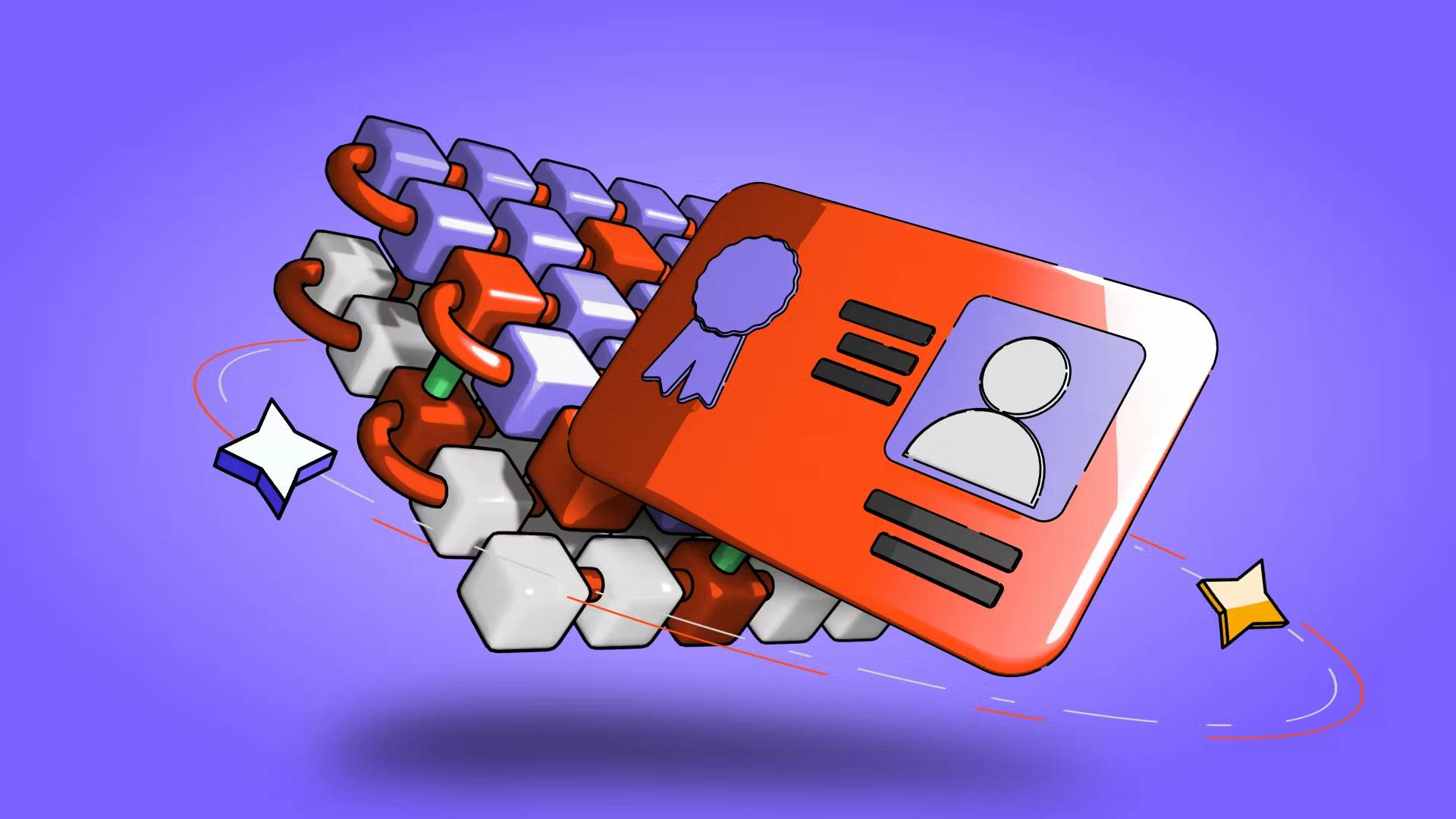Understanding Decentralized Identity (DID)
December 5, 2025

by Coinmetro Editorial Team
December 5, 2025
Decentralized Identity (DID) marks a significant shift from traditional centralized models to a system where individuals and organizations can autonomously manage their identities. Unlike systems controlled by central authorities (e.g., service providers or governments), DIDs allow users to create and maintain their identifiers using blockchain technology. This control enhances security and privacy by minimizing reliance on external validators and reducing the risks associated with data breaches in centralized databases.
The essential difference between DIDs and traditional identity systems, like usernames and passwords, lies in the control over identity verification. Conventional systems depend on a central authority to verify and store identity data, whereas DIDs operate on a decentralized network, significantly reducing the possibility of centralized data failure or exploitation.
But how big of a challenge is digital identity these days? The lack of secure, decentralized identity systems on platforms like X (Twitter), Meta, and YouTube allows rampant fake accounts. For example, impersonators of figures such as Elon Musk, Michael Saylor, or Vitalik Buterin - to name a few - use deepfake videos and deceptive posts daily to promote fraudulent cryptocurrency schemes. These issues could be mitigated with decentralized identity verification, enhancing security and trust across social networks by making it harder for malicious actors to exploit users anonymously.
The two primary components of a decentralized identity system are Decentralized Identifiers (DIDs) and Verifiable Credentials (VCs):
Decentralized Identifiers (DIDs): These are essentially unique digital identifiers created, owned, and controlled using blockchain technology or other forms of decentralized networks. They ensure the holder can prove ownership through cryptographic means without relying on a central registry. The identifiers are designed to be persistent and resolvable across different systems, making them versatile for various applications, from personal identification to supply chain management.
Verifiable Credentials (VCs): Represent digital forms of traditional documents like diplomas, IDs, or membership cards. These digital credentials can be issued, held, and verified on-chain without a central verifying party. They use cryptography to allow the holder to prove ownership of the credential, enhancing the security and privacy of personal data.
Both elements are crucial in promoting a user-centric approach to identity management, where individuals have greater control and transparency over how their personal data is used and shared across the web. The flexibility and security inherent in DIDs are conducive to fostering a more trustworthy and efficient digital interaction environment.
These updated components reflect the ongoing evolution of the decentralized web, aligning with global standards such as those set by the World Wide Web Consortium (W3C) and are supported by various technology leaders and organizations working to advance these standards.
Decentralized identity technologies fundamentally transform how personal data is managed, offering significant security advantages over traditional identity systems. Allowing individuals to create and control their own identifiers without reliance on a central authority greatly reduces the risk of data breaches and identity theft. In decentralized systems, the data is not stored in a single location, making it less vulnerable to mass data breaches common in centralized databases.
Moreover, the concept of self-sovereign identity, which is integral to decentralized identity, empowers users with full control over their personal data. Individuals can decide how, when, and with whom to share their information, relying on cryptographic proofs to verify their identity securely. This autonomy not only reduces the risk of unauthorized access but also places the control of personal data back into the hands of the individual, potentially decreasing identity theft incidents.
Decentralized identity systems enhance privacy by design. By decentralizing the storage and management of identity data, these systems enable users to maintain private control over their personal information. Users can share only the necessary information required for a specific transaction rather than exposing more comprehensive personal data.
The elimination of centrally stored data not only minimizes the risk of large-scale data leaks but also reduces the ability of service providers to track or profile users without their explicit consent. This approach aligns with stronger privacy standards and regulations, providing users a more secure and private way to manage their digital identities.
Decentralized identity is making strides across various sectors, significantly enhancing the way personal and organizational data is managed:
Healthcare: Platforms like MediLinker leverage blockchain to secure and manage patient data, ensuring compliance with health regulations while empowering patients to control their health information. This method not only enhances privacy but also aligns with global health goals by improving health systems sustainably.
Finance: In the finance sector, decentralized identity can streamline processes such as anti-money laundering (AML) checks and Know Your Customer (KYC) protocols. It makes these processes more secure and efficient, reducing the risk of fraud and speeding up identity verification.
Government: Estonia has expanded decentralized identity technologies beyond healthcare to improve various public services. These implementations include digital citizenship initiatives that enable citizens to engage in activities such as voting, filing taxes, and accessing government services securely through digital IDs. This approach not only simplifies administrative procedures but also enhances the security and privacy of citizen data, exemplifying the transformative potential of decentralized identity in public administration.
Employment: The technology also aids in quick and reliable verification of credentials in the hiring process, reducing the time it takes to validate the qualifications of potential employees, as seen in uses where HR departments verify candidates' credentials via secure systems.
While decentralized identity offers numerous benefits, it also faces several challenges:
Scalability: As decentralized identity systems grow, maintaining performance without sacrificing security or user experience becomes challenging.
Interoperability: Different systems and standards need to communicate seamlessly for decentralized identity to be universally adopted. This requires a common set of protocols and standards that all systems can support.
To address these issues, ongoing advancements in blockchain technology and standardization efforts are critical. Projects like the Self-Sovereign Identity (SSI) model focus on creating frameworks that support easy integration and broad adoption across various platforms and industries. Moreover, efforts to include diverse populations and ensure user-friendly systems are vital in overcoming barriers to widespread use. These efforts aim to create a robust infrastructure that supports secure, scalable, and interoperable decentralized identity solutions across industries and use cases.
The current regulatory landscape for decentralized identity is shaped by various standards and guidelines that aim to ensure interoperability, security, and compliance across systems. An essential standard is the World Wide Web Consortium's (W3C) Decentralized Identifiers (DIDs), which has become a foundational component in the architecture of decentralized identity systems. This standard provides a framework for creating and managing digital identities without central authority, facilitating privacy and user control.
In addition to technical standards, regulatory frameworks like the General Data Protection Regulation (GDPR) in Europe significantly impact the adoption and implementation of decentralized identity solutions. GDPR emphasizes data protection and privacy for individuals within the European Union, requiring any identity solution to ensure data minimization, purpose limitation, and user consent, which aligns well with the principles of decentralized identity systems.
Looking ahead, the regulatory environment for decentralized identity is expected to evolve further to support these technologies' development and widespread adoption. The European Union is actively working on enhancing its digital identity framework through the European Digital Identity Initiative. This aims to provide secure and verifiable digital identities that can be used across all EU member states, improving accessibility and security for public and private services.
Moreover, ongoing developments in standards are likely to focus on enhancing security features, interoperability between different systems, and user-friendly access to digital identity services. Organizations like the Decentralized Identity Foundation continue to work on developing open, accessible, and secure standards to facilitate these advancements.
These ongoing efforts indicate a strong future focus on creating a regulatory and technical environment that supports secure, private, and interoperable digital identities, which could significantly enhance how personal and organizational identities are managed globally.
The field of decentralized identity is rapidly evolving, driven by advancements in blockchain technology and decentralized networks. These technologies are foundational to the growth of decentralized identity by ensuring that data remains secure, private, and under the control of the individual.
Emerging Technologies: Blockchain is at the heart of decentralized identity systems, providing a secure and transparent way to verify and manage digital identities without central authority. This technology is not only enhancing security but also increasing trust among users and providers. Decentralized networks further contribute by distributing data across multiple nodes, thus eliminating single points of failure and reducing the risk of data breaches.
Future Developments: Looking ahead, we can expect significant innovations in decentralized identity. One key development area is integrating artificial intelligence (AI) with blockchain to automate and enhance identity verification processes. AI could help in detecting fraud more efficiently and managing identities at scale. Another exciting prospect is the broader adoption of zero-knowledge proofs, which allow verifying information without revealing the actual data, thus preserving privacy.
Moreover, as the Internet of Things (IoT) expands, decentralized identity could become crucial in securely managing the vast number of devices and their interactions. This could involve devices having their own identities or DIDs, which could interact autonomously and securely within the IoT ecosystem.
These developments suggest a promising future where decentralized identity systems streamline how we manage our digital identities and enhance our ability to control and protect personal data in an increasingly digital world. As these technologies mature, we can expect broader adoption across industries, leading to more robust, efficient, and user-friendly identity management solutions.
Join the Coinmetro community on Discord and Telegram, where forward-thinking traders and investors gather to share insights, explore new opportunities, and dive deep into cryptocurrencies. Should you need any help, please contact our world-class Customer Support Team via 24/7 live chat or email at hello@coinmetro.com.
To become a Coinmetro user today, Sign Up now, or head to our new Exchange if you are already registered to experience our premium trading platform.
Tags
Related Articles

Regulatory Sandboxes: Fostering Crypto Innovation Within Legal Frameworks
The cryptocurrency industry’s fast rise fuels an important debate. Innovation aims to transform finance, enhancing speed and access. Yet, regulators…
5m

Crypto Options Trading: Strategies and Market Insights
Cryptocurrency markets have rapidly expanded beyond simple buying and selling. One of the most significant developments has been the rise of…
6m

The Rise of Social-Fi: Blending Social Media with Decentralized Finance
In recent years, social media and finance have started to merge, creating Social-Fi. This concept blends the engagement of social platforms with…
6m

DeFi Insurance Platforms to Watch in 2024
Decentralized Finance (DeFi) insurance addresses the growing need for insurance against hacks, smart contract failures, and other DeFi-related risks.…
7m